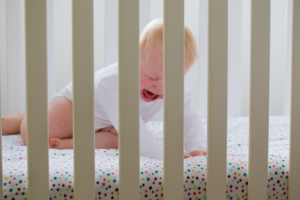
For the longest time it seems sleep trainers kept telling us all that babies shouldn’t wake at night. That these wakings were “abnormal” and “wrong”. There has now been enough evidence mounting that it seems enough clients are now questioning the wisdom of this idea that babies shouldn’t be waking. Is this enough to stop sleep trainers from pushing their behavioural methods?
No. Instead it seems they have shifted gears as evidenced by the new line of reasoning which goes like this:
It is biologically normal for babies to wake until 6-7 months, but after that they don’t need to feed at night so any waking after is “behaviourally biologically normal” but in the same way as other “biologically normal” bad behaviours like picking your nose and eating it or having anger management problems. And because it’s “behaviourally biologically normal”, it is suitable to use behavioural techniques.
What are we to make of this?
To start, let me say that it is 100% bullshit. But it sounds appealing doesn’t it? Don’t we all “naturally” have bad behaviours we have to squash? What if waking is just one of those? Let’s take a look at the many claims here and see exactly why this constitutes nothing but sleep training BS to help promote methods in the face of valid criticisms of their assumptions.
There are lots of reasons to wake at night for young children and they have nothing to do with food.
Claim #1: Waking is only to do with feeding
Uh, no. Lots of babies will feed as part of a waking, especially breastfed babies because their tummies are small and breastmilk is so readily absorbable or just because breastmilk is also a means of soothing. However, research into infant and toddler sleep finds many reasons our kids wake outside of feeding, such as an inability to consolidate sleep cycles (which is a developmental skill), when learning new skills like crawling, walking, or speaking, when too cold or hot, when sick, when teething, when going through a growth spurt, when they have too much to process psychologically, and so on. There are lots of reasons to wake at night for young children and they have nothing to do with food.
I don’t even know what “behaviourally biologically normal” even means except to suggest the action is behavioural (it is) and it’s biologically normal (it is).
Claim #2: Because they don’t need to feed, wakings are behavioural in nature
This is a bizarre one because I don’t even know what “behaviourally biologically normal” even means except to suggest the action is behavioural (it is) and it’s biologically normal (it is). Somehow this is supposed to differentiate from waking for food (which is also a behavioural response to hunger). The only logical conclusion to this one is that having a behavioural response of waking to things like being scared, too cold or hot, having an active mind, being in pain, and so on are all “bad” which is what the next claim suggests, but this differentiation of “biologically normal” and “behaviourally biologically normal” is utter nonsense.
Just because something is common doesn’t make it biologically normal. Anger issues are not universal, but common in our culture often due to the way in which we raise our kids and our cultural beliefs about negative emotions that give rise to these inappropriate behaviours.
Claim #3: These behaviours are bad, like anger management issues
There’s actually two claims here: First that behavioural wakings are bad behaviours even if normal, and second that many of these other “bad” behaviours we’ve identified in our society are biologically normal. Let’s start with the latter. Just because something is common doesn’t make it biologically normal. Anger issues are not universal, but common in our culture often due to the way in which we raise our kids and our cultural beliefs about negative emotions that give rise to these inappropriate behaviours. Another one cited in favour of this “biologically behaviourally normal” business is picking one’s nose and eating it which may be more biologically normal for children but is not necessarily bad, only is within a cultural construct.
Second, are these wakings bad? No. They may be inconvenient for parents and sometimes there are underlying medical or other reasons why they are more frequent than one would expect (and those are things people can look to and work on), but they are not “bad” except as a cultural idea. If you choose to “work on them”, please know it is NOT because your child is displaying any bad behaviours and when you look at the many reasons why our children wake, hopefully you can see that they are often quite valid.
Although there were years of studies reporting success, what they reported was that mothers no longer reported their baby waking. What has changed recently is that we are looking at objective data for sleep and we see that these behaviourist techniques don’t change infant sleep at all.
Claim #4: Because the behaviour is “behavioural”, it is good to use “behavioural” techniques
Again, the logic here is mind-numbing even though I acknowledge it can sound nice to start. Okay, so let’s assume that all the claims above are actually okay (they aren’t), doesn’t it make sense that if something is behavioural, we can change it with a behavioural method?
I really would have thought by now we had enough psychological evidence that this first-wave behaviourism doesn’t hold much water at all, but it seems not. We are not robots that respond to a given stimuli in the same way each time (which is what first-wave behaviourism – and cry-it-out methods – represents), but complex creatures with so many working pieces and variables that that type of simplicity simply doesn’t work. The monkeys in Harry Harlow’s experiments didn’t go to the surrogate mother with food despite the predictions of first-wave behaviourists, but rather the one that offered comfort, despite our idea that food is the basis of life.
Punishment doesn’t work for kids or adults despite the behaviourist logic. Look at the criminal justice system and the constant call for more work on rehabilitation over punishment because recidivism is so high that clearly the “act-consequence” doesn’t work. Similarly, the push in many educational districts to remove recess to give more time to school is behaviourist and is failing children left, right, and centre.
But what about sleep? Don’t these methods “work”? Again, no.
Although there were years of studies reporting success, what they reported was that mothers no longer reported their baby waking. What has changed recently is that we are looking at objective data for sleep and we see that these behaviourist techniques don’t change infant sleep at all.
Just as they haven’t worked in the past, they continue not to work today. This may be why we also have research suggesting that the consolidation of nighttime sleep is a developmental process that is virtually unaffected by any environmental or behavioural change. It is simply something children come to in their own time, barring health or environmental considerations (like using screens or bright lights at night).
Which brings us full circle and to the following question for these sleep trainers: If behaviourist techniques do nothing to change the wakings of infants and toddlers, can we say they are “behaviourally biologically normal” or can we just stick with “biologically normal”?






Leave A Comment